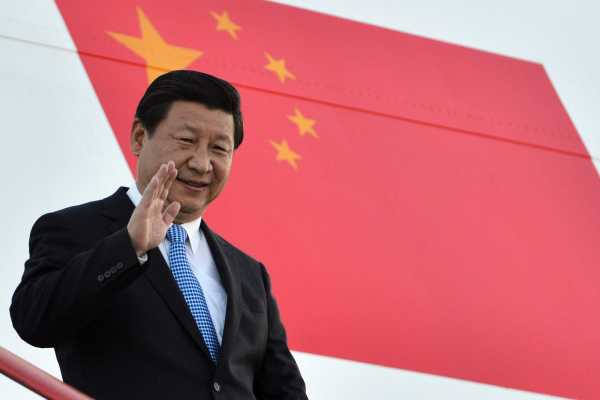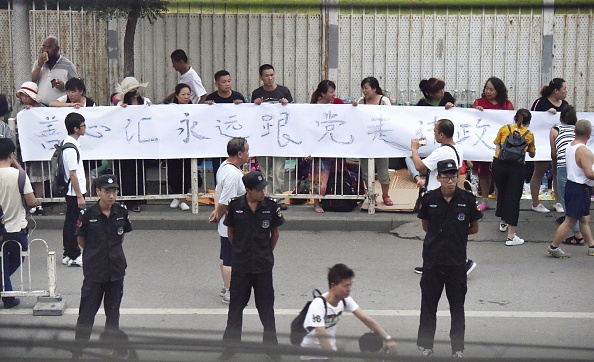
The art of suppressing dissent has been perfected over the years by authoritarian governments. For most of human history, the solution was simple: force. Punish people severely enough when they step out of line and you deter potential protesters.
But in the age of the internet and “fake news,” there are easier ways to tame dissent.
A new study by Gary King of Harvard University, Jennifer Pan of Stanford University, and Margaret Roberts of the University of California San Diego suggests that China is the leading innovator on this front. Their paper, titled “How the Chinese Government Fabricates Social Media Posts for Strategic Distraction, Not Engaged Argument,” shows how Beijing, with the help of a massive army of government-backed internet commentators, floods the web in China with pro-regime propaganda.
What’s different about China’s approach is the content of the propaganda. The government doesn’t refute critics or defend policies; instead, it overwhelms the population with positive news (what the researchers call “cheerleading” content) in order to eclipse bad news and divert attention away from actual problems.
This has allowed the Chinese government to manipulate citizens without appearing to do so. It permits just enough criticism to maintain the illusion of dissent and only acts overtly when fears of mass protest or collective action arise.
To learn more about China’s internet propaganda machine, I reached out to Roberts, one of the authors of the paper. I asked her how successful China has been at manipulating its population and, more importantly, if she thinks this brand of online propaganda will become a model for authoritarianism in the digital age.
You can read our full conversation below.
[Author’s update: On November 14, Reuters reported that the Russian government, under Putin’s leadership, is following China’s model. The Kremlin, according to the report, has sent “instructions” to 45 major companies demanding that they supply news stories that put the country and its leadership “in a positive light.” Russia’s approach is eerily similar to China’s, and probably a sign that we can expect to see more of this from other countries.]
Sean Illing
How does China use the internet to manipulate its population?
Margaret Roberts
With this particular study, we were motivated by rumors of what’s called the “50 Cent Party” in China [more on this below]. People were convinced that China was engaged in a widespread online propaganda campaign that targeted its own population. But we never had direct evidence that this was ongoing.
Then in 2014, there was a massive leak that revealed what China was doing and how they organized their propaganda machine. So that gave us an opportunity to look at the actual posts the Chinese government was producing and spreading on the web for propagandistic purposes.
We gathered up all the data from the leaked email archive, and that allowed us to explore the content of the propaganda, which is something that no one had done before.
Sean Illing
And what did you find?
Margaret Roberts
We had always thought that the purpose of propaganda was to argue against or undermine critics of the regime, or to simply persuade people that the critics were wrong. But what we found is that the Chinese government doesn’t bother with any of that.
Instead, the content of their propaganda is what we call “cheerleading” content. Basically, they flood the web with overwhelmingly positive content about China’s politics and culture and history. What it amounts to is a sprawling distraction campaign rather than an attempt to sell a set of policies or defend the policies of the regime.
Sean Illing
I want to dive deeper into that, but I want to make sure we don’t glide past the “50 Cent Party” reference. Can you explain what that is?
Margaret Roberts
The 50 Cent Party is a kind of informal branch of the Chinese government that carries out its online propaganda campaign — so these are the foot soldiers who post the content, share the posts, etc. The name stems from the rumor that the members were each paid 50 cents for every post that helped the government. We didn’t find evidence that people were being paid 50 cents, however. It turns out posting online propaganda is just part of a government job.
Sean Illing
Do we have any idea how many members there are or how many people occupy these posts?
Margaret Roberts
The rumor before we started studying this is that it’s something like 2 million people, but we simply don’t know for sure. But we estimate that the government fabricates and posts 448 million social media comments a year.



Sean Illing
So let’s talk about China’s strategy. In the paper, you point out that China’s government actively manipulates its population, but that it doesn’t necessarily appear that way to its citizens. Part of the reason for this is China’s unusual approach to propaganda, which is to avoid refuting skeptics or defending policies and instead flood the digital space with happy news. What’s the strategic logic behind this approach?
Margaret Roberts
We think the purpose is distraction, because these posts are highly coordinated within certain time periods and the posts are written uniformly over time. They’re actually really bursty (meaning lots of similarly themed posts at the same time). The basic idea seems to be to flood the internet with positive noise in order to drown out bad news and distract from more serious or problematic issues.
Sean Illing
And they believe this is the most effective way to control political discourse?
Margaret Roberts
I think they realized that politics is about controlling the narrative and setting the agenda. Politicians and government officials in China want people to talk about the issues that reflect well on them. Their calculation is pretty simple: If they engage critics on issues that are complicated or reflect poorly on the government, they only amplify the attention those issues receive. So their approach is to ignore the criticisms and shift attention to other topics, and they do that by deluging the internet with positive propaganda.
Sean Illing
Are these positive stories actually true, or are we talking about “fake news”?
Margaret Roberts
This is a really interesting question. A lot of what we found in the leaked archive isn’t fake news. What they’re creating are stories that promote patriotism. They want people talking about and responding to content that favors the regime. But they also want people to think that content is coming from civilians and not from the government, which is why most of this is presented as someone’s opinion.
Sean Illing
What form does this cheerleading content take? What kinds of stories do they promote?
Margaret Roberts
The most common articles we found discussed how great it is to live in China or how wonderful Chinese culture is or how dominant China’s sports teams are — that kind of stuff. We’re not really talking about fact-based material here. It’s just positive stories that flatter the regime and the country.
Again, the point isn’t to get people to believe or care about the propaganda; it’s to get them to pay less attention to stories the government wants to suppress.
“But I think the world will have to struggle with this new reality of online propaganda, because it isn’t going away”
Sean Illing
Something else that jumped out at me in the paper was this idea that they want to permit just enough criticism to offer the illusion of dissent, but they want to make sure that there’s never enough criticism to spark collective action.
Margaret Roberts
China monitors the online information environment in order to collect information about the public and what they’re thinking. In that sense, they want people communicating freely. But a problem arises when you have too many people criticizing the government at the same time. There’s a constant risk of collective action or mass protest.
China’s government does its best to distinguish between useful criticisms (the kinds of criticisms that help them figure out how to satisfy the citizenry) and dangerous criticisms (the kinds of criticisms that might lead to mass protest events). They usually wait until there is a possibility for major mobilization against the government before they engage in overt censorship.
Sean Illing
Is China’s use of the internet unique or new? Are other governments doing similar things?
Margaret Roberts
I think there are aspects of the Chinese model that are new and unique, and certainly they’ve been at the forefront of trying to figure out how to control the internet. There is some evidence that other countries are learning from China, but nothing definitive.
Sean Illing
In the paper, you suggest this research might lead us to rethink the notion of “common knowledge” in theories of authoritarian politics — what does that mean?
Margaret Roberts
I think historically a lot of people have thought that common knowledge about things the government maybe has done wrong is detrimental to the regime. This is the idea that any criticism is detrimental to the regime. What we find in China is that criticism can be very helpful to the regime because it can allow them to respond.
But the type of common knowledge that’s really dangerous to the regime is knowledge of protests or other forms of collective action activity. That’s a major threat because it can spread so easily. We’ve seen this over and over throughout world history: Regimes are most vulnerable when small protests escalate into something much broader. This is what China’s government is determined to prevent.



Sean Illing
To be clear, you call China’s approach “strategic distraction,” but it’s really about undercutting the possibilities for organized dissent. Regimes have always tried to capture people’s attention and redirect it in less dangerous directions. The only thing new about China’s operation is its use of the internet.
Margaret Roberts
I think that’s exactly right on.
Sean Illing
Do you think China’s approach to suppressing dissent is uniquely effective in an age of “fake news” and “post-truth”?
Margaret Roberts
The internet has created an environment in which there is a vast amount of information. That means it’s difficult for people to separate out “good” and “bad” information. Because many people have short attention spans online, they can easily be affected by information that looks like something it is not. That’s what China’s online propaganda and fake news have in common — they both take advantage of our short attention spans on the web.
Sean Illing
Is this a model for authoritarianism in the digital age? Should we expect more of this from other governments?
Margaret Roberts
The difficulty with online propaganda, and we’re seeing this in the US and other democracies around the world right now, is that it doesn’t function overtly like traditional forms of censorship. Most people object to blatant censorship. But online propaganda is a form of participation as well as form of censorship, so it’s difficult to know what the right policy is.
People want to introduce information on the web en masse, and that means a lot of noise and opinions and bots and commentators. Are there ways of regulating all of this without censoring ourselves? I think that’s a really hard question, and I don’t have the answers. But I think the world will have to struggle with this new reality of online propaganda, because it isn’t going away.
Sourse: vox.com
0.00 (0%) 0 votes


































